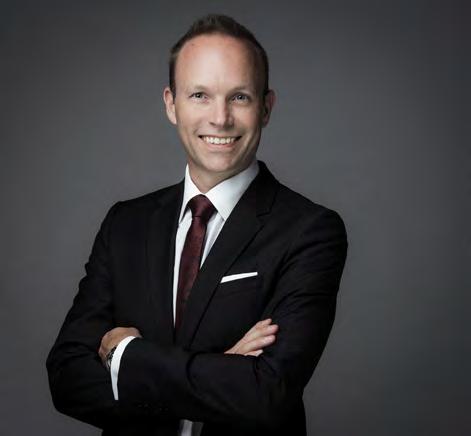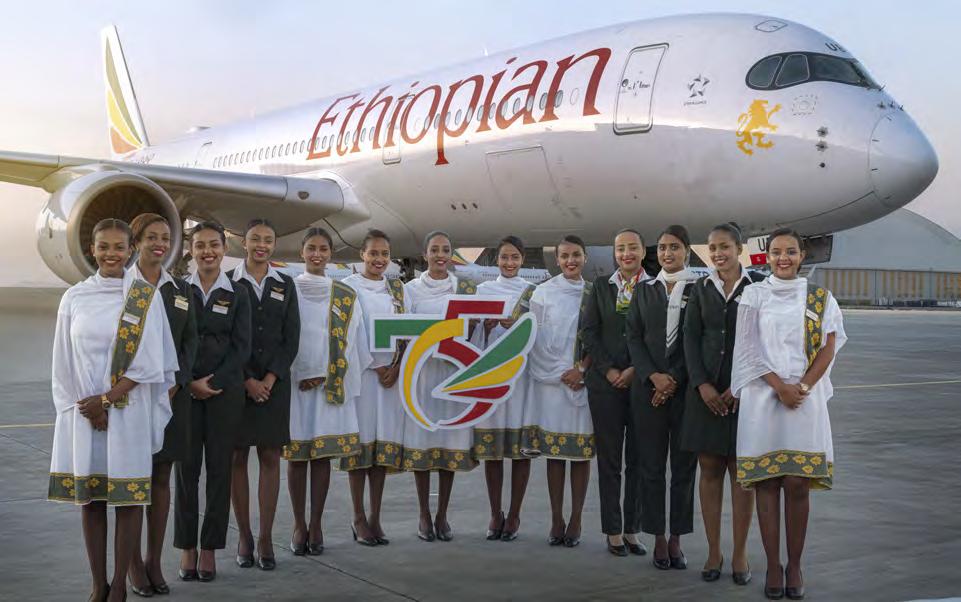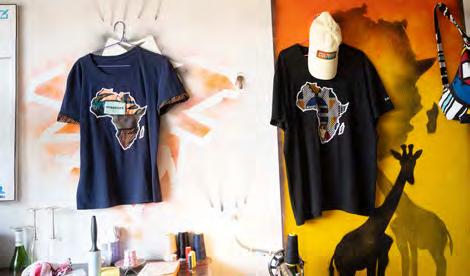
10 minute read
PEOPLE BEFORE PROFITS” is critical to the long-term Success of Hotels- Tim Cordon writes
is critical to the long-term Success of Hotels- Tim Cordon writes
Advertisement
Hotels that fought back against COVID-19 with an entrepreneurial approach in all facets will reap the rewards in the long run When President Cyril Ramaphosa announced the easing of several restrictions on 1 February 2021, the South African hotel industry let out a cautious sigh of relief. Closures, furloughs and significantly decreased occupancy rates have all been part of the struggle, but with sales of alcohol now allowed, beaches and parks being reopened, and an extension of the curfew, many started relooking their balance sheets. They were hoping to reopen, possibly squeeze a bit of liquidity out of the coming weeks to counter looming insolvency and begin considering the possibility of a full staff complement once again. At Radisson Hotel Group, however, we have actively avoided closing hotels and consistently tried to limit retrenchments at the first sign of trouble. Throughout the pandemic, during lockdowns and more open periods of trading, we have tried to keep our hotels operating and to do everything in our power to retain as many team members as possible, leveraging all our creative energies to expand and tailor our offerings and boost bookings. Also included were Radisson Hotels Safety Protocols to protect guests and staff, along with the introduction of Hybrid Meetings, Hybrid Rooms and Radisson Individuals. The latter was a pandemic-born hotel brand designed to assist smaller hotel brands to remain operational thanks to an association with the Radisson brand.
Uncharted territories led to new discoveries
Back in March 2020, we knew that it would be our reaction to the pandemic that would define us during the crisis – and also once we finally emerge on the other side. We could never be certain what the outcome of keeping our doors open would be. We were entering entirely uncharted territory, but one thing was certain: if we closed, our income would be zero. Once a hotel is closed, even temporarily, cash flow dries up entirely. But the building itself still requires maintenance and other basic services, which must be paid for. Our decision has proven correct. Hotels in Africa that have stayed open have done better, overall, than those that chose to close, and have seen a positive cash flow. This of course was the outcome we had hoped for and we certainly are very relieved about the success. But it was our entrepreneurial approach, rather than cash flow, that directed this decision to continue operating. The focus of our motivation was always our team because underpinning our decision to continue operating our hotels is the acknowledgment that they’re crucial to the success of any establishment. Simply put, the hotel business might be run in an exquisite and expensive building, but the people who make things work and breathe life into the hotel – the team – make the experience for the guests. The unique selling points of a hotel no longer revolve around location only; the guest experience is equally, if not, more important. Literally, every moment matters, and we have to ensure our guests have the very best experience possible – which is impossible without our staff. We invest significant time in selecting and developing our team members, then empower them with the correct tools to get on with their jobs. If you don’t have the team to deliver the experiences and create those unforgettable moments for your guests, you don’t have a hotel – you only have a building. As such, we acknowledge the many difficult sacrifices that our team members across the spectrum were called on to make. We believed instinctively that our long-term survival and the longevity of our brand depended on remaining open and how we approached the issue of staff retention during the worst of COVID-19. As a result, we have addressed those sacrifices our teams have made in a very personal – and personable – way, applied consistently across our worldwide operations. We have long espoused a brand ethos that prides itself on its culture and people-first approach, and it was important that we choose integrity, inculcating a genuine culture of “every person matters”, from the top down – especially at this time when the future of the industry is on a knife-edge.
Ethics, ethos and enduring businesses
Our experience over the past year has taught us that this is a time for hotels, like all brands, to stick to their ethical practices, stay true to their entrepreneurial nature, live their “people before profits” ethos in how they deal with inevitable adjustments in staffing requirements, and save as many jobs as possible – knowing that it is people who are at the centre of the very culture of such establishments.
This is also the time to drive innovation, consistently remain open-minded and pursue those unchartered territories to find and create those business opportunities that will keep our hotel doors open as we all navigate through this unpredictable time. By Tim Cordon, Area Senior Vice President, Middle East & Africa, Radisson Hotel Group Tim Cordon is the Area Senior Vice President for the Middle East and Africa of the Radisson Hotel Group. Based in Dubai, Cordon is responsible for leading hotel operations and delivering growth and profit, with over 100 hotels in operation and over 80 hotel projects in the development pipeline. Cordon holds a degree from Nottingham Trent University in Mechanical Engineering and Design and Technology, including qualified teacher status. In 2006, he entered the British Hospitality Hall of Fame with the ‘Alpha Forum Prize – Young Manager’ award. For two consecutive years, he has secured a spot in the top 5 of Hotelier Middle East’s Power 50 list.
Ethiopian Marks 75th Anniversary
Ethiopian Airline Group, the largest Pan-African aviation group, celebrates its 75th anniversary today, April 8, 2021. Ethiopian made its maiden international flight on April 8, 1946 to Cairo. Since then, the Airline overcame the ups and downs of the aviation industry and the challenges unique to Africa to become Africa’s largest, most profitable and award-winning Aviation Group. Ethiopian kicks off a yearlong celebration under the theme “Celebrating 75 Years of Excellence”.
Ethiopian Airlines Group CEO Mr. Tewolde GebreMariam said, “As we celebrate 75 years of excellence, we take stock of our accomplishments over three quarters of a century. Among the many firsts introduced by Ethiopian are the first Jet aircraft in Africa, the first East Africa to West Africa scheduled flight, the first airline from the Western Hemisphere to fly to China, the first scheduled service between the capitals of the most populous nations in the world (from New Delhi to Beijing), the first airline in Africa to introduce the B767, B777-200LR, B787(the Dreamliner) and later on the A350 to Africa. Today, our industry faces a serious challenge posed by COVID-19. The route we chose to overcome this challenge is to tighten our belts, change the way we do business and be agile. We remain the only commercial airline that hasn’t sought a government bailout and didn’t lay off a single employee. I would like to take this opportunity to cement our commitment to sustainable aviation and continue to work with all stakeholders to enhance Africa’s air connectivity. While congratulating all Ethiopian families, I would like to thank our esteemed customers for their strong vote of confidence, their loyalty and support.’’ Ethiopian attributes its success to the four pillars of its growth strategy. These pillars are human resource development, modern fleet, infrastructure development and technology. It will continue to focus on these pillars with renewed emphasis on sustainability. It will also continue partnering with other African airlines and governments to create a robust, competitive airline industry in Africa by sharing its technical and management expertise.

NAMIBIA’S AFROPRINT LINE AIMS AT MAKING ECO-FASHION A WAY OF LIFE

From add-ons in shirts made from fabric wastes to designs that give you a dashing bit of Namibia, fashion company, Afroprint Line is changing people’s tastes towards ecofriendly fashion. The company specialises in everything with prints and creating unique patterns on bags, clothing, accessories etc. with upcycled material off-cuts. Founder, Ndeshi Fikameni says the journey to achieving their goal has been a great one so far since their inception in 2018.
Speaking to VoyagesAfriq, she said, “So what we do is that we collect off-cuts from other tailors; when they make their garments, we take the small pieces and we use them to make add-ons on shirts and others. We also like to use ecofriendly fabrics made from things like jute plant to make bags, etc. “ She added that tourists and locals really love their products not only because they are unique but also they are personalized with a touch of Namibian identity. “So in a shirt for example, we can print it with names of local towns and places in Namibia. We also have a game that promotes fast-thinking and educating people about Namibia,” she averred. Ever mindful about giving back to the society in which they operate, Ms. Fikameni said collaborations with big clients have helped to make their initiative towards affordable housing possible. “Africaprint Line has collaborated with big corporates in Namibia. One of our big collaborations was with Standard Bank, and they’ve really supported us, they bought large number of T-shirts, shopper bags as part of ‘Buy a Brick’ campaign which is a campaign that helps subsidise housing in Namibia,” she iterated.
• Ndeshi Fikameni, Founder of AfroPrint

Sony Music celebrates African Music Icon, Sibongile Khumalo
Celebrated jazz and opera singer, Sibongile Khumalo, passed away on Thursday, 28 January, after a lengthy period of illness.
Reflecting on his relationship with Ma Khumalo, Managing Director of Sony Music Entertainment Africa, Sean Watson, shared his thoughts on the late musician: “A more noble ambassador of music I have never met in my time. Sis’ Sibongile was the consummate musician and her love of her art shone through her work and her person. She was professional at every turn and resolute in protecting her creative values. We will miss her gracious presence.”
Dr. Lindelani Mkhize expressed his deep sadness at the passing of the jazz veteran, “This is very sad. Sibongile was one of the first artists that we signed to Sony Music and at that time she was an opera singer. I convinced her to do jazz, and jazz was not selling at that time. We were told at the time that we would never sell 5000 units, but her album, Ancient Evening, went on to sell Gold and was the very first Jazz album in SA to do so. She revived Jazz music in the market.”
Sibongile’s former manager, Lazarus Serobe shared his own recollection of the globally revered singer, “My memories of Sibongile start from 1995 when myself and Lindelani signed her to Sony Music. I have worked and travelled with her for many years and she was always a pleasure to work with, a consummate professional. She was a woman of principal and only did something if she felt it was right. Nelson Mandela called her the Nightingale of South Africa and was honoured whenever he was serenaded by her.” Standard Bank Young Artist Award at the Grahamstown Arts Festival in 1993. She has performed on local and international stages including former President Nelson Mandela’s 75th birthday and 1994 inauguration, “The 3 Faces of Sibongile Khumalo” performance in 1992, performances with the London Philharmonic Orchestra in 1994 and 1995, Handel’s Messiah with Lord Yehudi Menuhin in 1995 as well as leading the South African and New Zealand national anthems during the World Cup Rugby Final in 1995.
The First Lady of Song, as termed by Nelson Mandela, holds a Bachelor of Arts (BA) degree in music from the University of Zululand, a BA Honours from the University of the Witwatersrand and honorary doctorates by the University of South Africa and the University of Zulu-Land.
Khumalo was awarded the Order of Ikhamanga in Silver by the presidency for her “excellent contribution to the development of SA art and culture in the musical fields of jazz and opera” by former President Thabo Mbeki.









